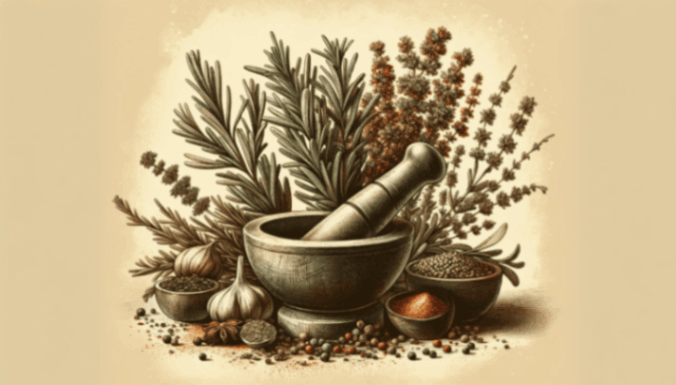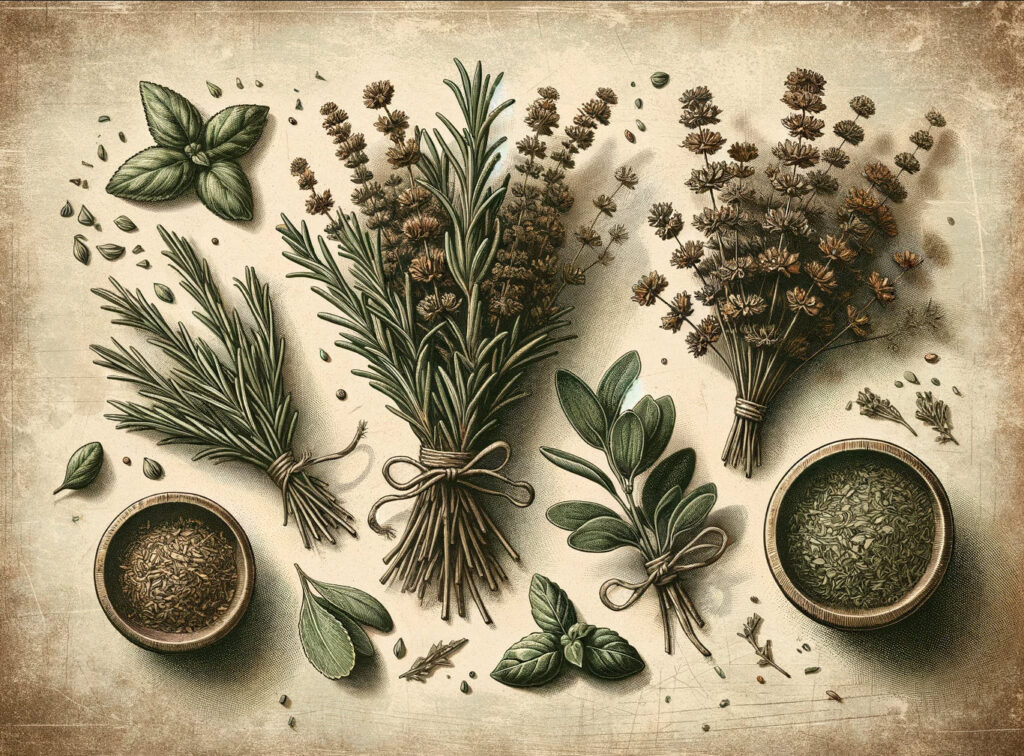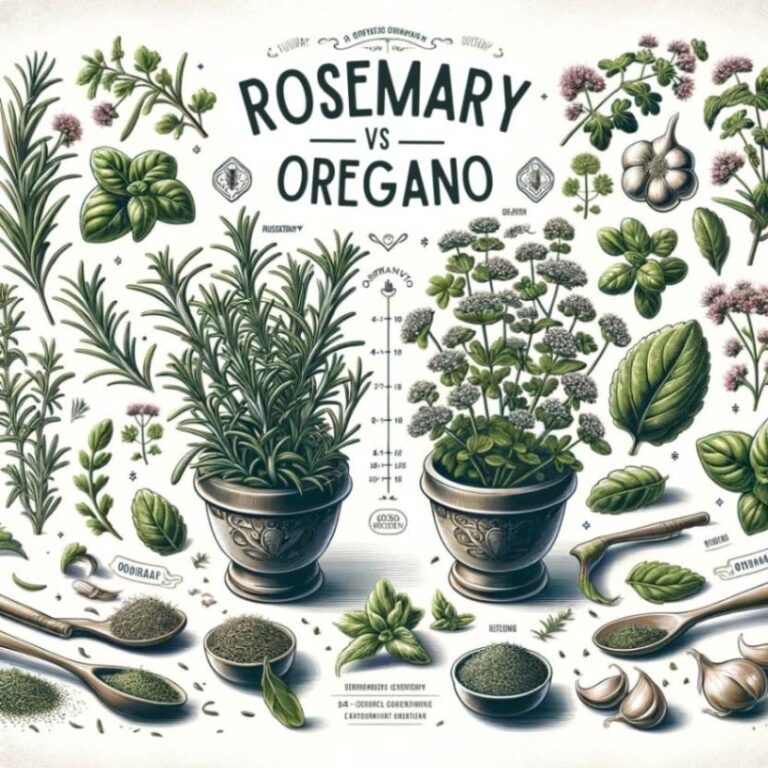This post may contain affiliate links which means I may receive a commission for purchases made through links. I only recommend products that I have personally used. As an Amazon Associate I earn from qualifying purchases. Learn more on my Private Policy page.
Rosemary and oregano are culinary herbs native to the Mediterranean that have been used for centuries. Integral to Mediterranean, Mexican, and Italian cuisines, these herbs are known for their unique flavors.
When should you use rosemary vs oregano in your cooking, and vice-versa?
Choosing between rosemary and oregano depends on the dish and taste preference. Rosemary is great for roasted meats and potatoes with its strong pine-like flavor. Oregano works well in tomato-based dishes such as pasta and pizzas, with its earthy, mildly bitter flavor. Rosemary and oregano are not interchangeable.
Keep reading for a deeper dive into rosemary and oregano flavor profiles, substitutions, culinary uses, and how to grow them in your herb garden.
Table of Contents
Flavor Profiles of Rosemary vs Oregano
Let’s explore the flavor profiles of rosemary and oregano to understand what sets them apart.
Rosemary: Distinctive Pine-Like Flavor
Rosemary is characterized by its unique pine-like flavor. When used in cooking, rosemary imparts a slightly woody and resinous flavor reminiscent of the outdoors. Its robustness makes it an excellent choice for hearty dishes like roasted meats, stews, and soups.
Oregano: Earthy & Slightly Bitter
Oregano offers an earthy and slightly bitter taste. Oregano’s flavor is also often described as warm and savory with hints of sweetness. It pairs well with tomato-based dishes such as pizzas, pasta sauces, and grilled vegetables.

Comparing the Strength and Complexity of Rosemary and Oregano
While rosemary and oregano offer distinct flavors, there are differences in intensity and complexity. Rosemary has a stronger presence due to its bold pine-like taste, whereas oregano provides a milder yet still flavorful experience.
Rosemary exhibits more layers with its resinous undertones compared to oregano’s earthiness. Rosemary and oregano possess their own distinct appeal, and when combined, they offer an array of culinary possibilities.
| Rosemary | Oregano | |
|---|---|---|
| Flavor Profile | Strong, woodsy, with a hint of pine | Pungent, earthy, slightly bitter |
| Aroma | Resinous, pine-like | Aromatic, slightly spicy |
| Culinary Uses | Ideal for meats like chicken, pork, lamb; soups, marinades | Common in pasta dishes, stews, pizza, tomato-based sauces |
| Common Pairings | Pairs well with garlic, thyme, sage | Complements basil, parsley, thyme |
| Cuisine | Frequently used in Mediterranean cuisine | Prominent in Italian, Greek, and Mexican cuisines |
| Fresh vs Dried | Both forms are used, fresh imparts a stronger flavor | Often used dried, but fresh offers a milder flavor |
| Substitutes | Marjoram, thyme, sage | Basil, thyme, marjoram |
Substitutions for Rosemary and Oregano
If you find yourself in a situation where you don’t have rosemary or oregano on hand, there are several alternative herbs that you can use as substitutes. But…
Can you substitute oregano for rosemary? Or rosemary for oregano?
Nope! Not really.
Rosemary and oregano are not ideal substitutes for each other due to their distinct flavor profiles. Rosemary has a strong, pine-like, and woodsy flavor, while oregano is earthy with a slightly bitter taste. For rosemary, thyme or sage can be a better substitute; for oregano, marjoram or basil might be more suitable.
It’s more effective to use substitutes that closely match the flavor profile of the herb you’re replacing, and rosemary and oregano don’t closely match in terms of taste.
What Can Be Substituted for Rosemary?
Some good substitution options for rosemary include:
- Thyme: With its woody aroma and subtle mint undertones, thyme is an excellent choice when you want to replicate rosemary’s earthiness.
- Sage: Known for its savory flavor, sage can add depth and complexity to dishes just like rosemary does.
- Tarragon: If you’re looking for a herb with a touch of licorice-like sweetness, tarragon can be a suitable substitute for rosemary.

What is a Good Replacement for Oregano?
When it comes to replacing oregano, consider these herbs:
- Marjoram: This herb is closely related to oregano and shares many similar qualities, making it an ideal substitute.
- Basil: While basil has a distinct taste of its own, it can still complement dishes that call for oregano by adding freshness and brightness.
- Thyme: Thyme not only works well as a replacement for rosemary but also lends itself as an alternative option for oregano due to its versatility.
It’s important to note that each substitution may have a slightly different effect on the overall flavor of your dish. While these alternatives can mimic the earthy and aromatic qualities of rosemary and oregano, they may bring their own unique characteristics to the table.
Culinary Uses of Rosemary vs Oregano
Rosemary and oregano each bring their own unique flavors and characteristics to dishes, making them essential ingredients in many recipes.
Cooking with Rosemary
Rosemary brings a distinct, woodsy fragrance to your cooking, enhancing the flavor of your recipes with its unique characteristics. Here are some ways rosemary is commonly used:
- Roasted Meats: Ideal for lamb, chicken, and beef, rosemary adds an earthy touch to roasted meats.
- Infusions: Used to infuse oils or vinegar, perfect for salad dressings and marinades.
- Roasted Potatoes: Seasoning roasted potatoes with rosemary creates a crispy, aromatic taste.
- Focaccia Bread: A key ingredient in focaccia, adding a pine-like flavor to this soft Italian bread.

Cooking with Oregano
Known for its robust flavor, oregano is a staple in many cuisines, especially in dishes that require a bit of peppery zest. Here are some of oregano’s common applications:
- Tomato-Based Sauces: Adds a slightly bitter and peppery taste to marinara or pizza sauce.
- Greek Cuisine: Integral to dishes like moussaka and Greek salads.
- Spaghetti Bolognese: Enhances the rich tomato sauce in this classic pasta dish.
- Greek Souvlaki: A key component in the marinade for this popular grilled meat skewer.
Creative Ways to Incorporate These Herbs
Beyond their traditional uses, rosemary and oregano can be incorporated into everyday cooking in creative ways:
- Rosemary: Infuse honey with rosemary for a unique twist on a sweet condiment that can be drizzled over desserts or used in cocktails. Sprinkle chopped rosemary leaves over roasted vegetables to elevate their flavors and add an aromatic touch. Rosemary can also be infused into butter and spread onto warm bread or used as a finishing touch for grilled steaks.
- Oregano: Mix dried oregano with olive oil, garlic, and lemon juice to create a flavorful marinade for chicken or fish. Add oregano to homemade salad dressings for an extra burst of flavor. You can even make oregano-infused oil by steeping the herb in olive oil, creating a versatile ingredient for various dishes.
Rosemary vs Oregano in the Herb Garden
While distinct in their growth habits, rosemary and oregano share several similarities that make them excellent companions in the herb garden.
Similar Growing Conditions
- Well-Drained Soil and Sunlight: Rosemary and oregano thrive in well-drained soil and require full sun exposure, making them suitable companions in the garden.
- Drought Tolerance: As drought-tolerant herbs, they can withstand periods of low water, reducing the need for frequent watering and maintenance.
Companion Planting Benefits
- Pest Deterrence: Rosemary’s strong aroma is beneficial in repelling certain garden pests, which can be advantageous for protecting nearby oregano plants.
- Natural Ground Cover: Oregano’s growth pattern spreads outwards and acts as a natural ground cover. This helps in suppressing weed growth and minimizing soil erosion. The dense foliage of oregano ensures less space for weeds to grow, thereby reducing garden maintenance.

For a more in-depth exploration of what grows well with these two herbs (and what doesn’t), check out my companion planting guides below:
In terms of hardiness zones, rosemary is more suitable for warmer climates and is typically hardy in zones 7-10. Oregano, on the other hand, is more adaptable and can thrive in a broader range of zones, usually 5-10. Consult the USDA Hardiness Zones Map to find what zone you live in.
| Rosemary | Oregano | |
|---|---|---|
| Plant Type | Perennial shrub | Perennial herb |
| Climate | Prefers warm, sunny climates | Adaptable to various climates, prefers warmth |
| Soil Requirements | Well-drained, slightly alkaline soil | Well-drained, slightly acidic to neutral soil |
| Watering Needs | Drought tolerant, requires less frequent watering | Regular watering, but avoid overwatering |
| Sunlight | Full sun | Full sun to partial shade |
| Hardiness | USDA Hardiness Zones 7-10 | USDA Hardiness Zones 5-10 |
| Propagation | Cuttings or layering | Seed, cuttings, or division |
| Height | Up to 3-5 feet (1-1.5 m) | 8-24 inches (20-60 cm) |
| Spacing | 24-36 inches (60-90 cm) apart | 12-18 inches (30-45 cm) apart |
| Growth Speed | Slow to moderate growth rate | Fast-growing |
| Lifespan | Can live for several years | Perennial, but often grown as an annual |
For tips and tricks on how to grow rosemary at home, check out my Complete Guide to Rosemary.
Combining Rosemary and Oregano in Your Cooking
Rosemary and oregano pair well in dishes featuring Mediterranean or Italian flavors, as both herbs are commonly found in these cuisines. Add a sprig of rosemary and a sprinkle of oregano to roasted vegetables or grilled meats for an aromatic and savory taste.
Balancing the Intensity of Both Herbs
To achieve a well-balanced dish, it’s important to consider the intensity of both herbs. Rosemary can be overpowering if used excessively, so it’s best to use it sparingly initially. Oregano is generally milder in flavor but can contribute significantly to the overall taste. If you prefer a more subtle flavor profile, add smaller amounts of each herb and adjust according to your taste preferences.
Getting Creative with Other Spices or Ingredients
While rosemary and oregano work well together on their own, they also pair beautifully with other spices and ingredients. Add garlic, thyme, or basil to oregano and rosemary dishes to create a more complex flavor profile.

Conclusion
Rosemary and oregano are both versatile herbs that add distinct flavors to dishes. Rosemary has a bold and pine-like flavor, while oregano offers a more earthy and slightly bitter taste.
Rosemary is commonly used in roasted meats, potatoes, and bread, while oregano is a staple in Italian cuisine and pairs well with tomato-based dishes like pasta sauces and pizzas.
When growing your own herb garden, both rosemary and oregano are relatively easy to cultivate. These two herbs have similar growing requirements and make for good garden companions. By including these herbs in your garden, you’ll have fresh flavors at your fingertips whenever you need them.
Frequently Asked Questions (FAQs)
Is rosemary or oregano better for cooking?
The choice between rosemary and oregano depends on the dish and personal taste. With its pine-like flavor, Rosemary is great for roasted meats and potatoes. Oregano has an earthy, slightly bitter taste that works well in tomato-based dishes. Experiment with both to find your preferred flavor combinations.
Which herb is more common in Mediterranean cuisine, rosemary or oregano?
Oregano is more prevalent in Mediterranean cuisine and is often used in Greek salads, Italian pasta, and Spanish stews for its robust flavor.
Are there any health benefits associated with consuming rosemary or oregano?
Rosemary and oregano are rich in antioxidants. Rosemary may aid digestion and memory and reduce inflammation. Oregano offers antibacterial and antifungal benefits, potentially boosting immune health. They add both flavor and nutrition to meals.
Can I grow rosemary and oregano at home?
Both rosemary and oregano can be easily grown in pots or garden beds with well-drained soil, ample sunlight, and regular watering. This allows you to enjoy fresh, homegrown herbs.
Last Updated on 18 November 2023 by Bob Lee

